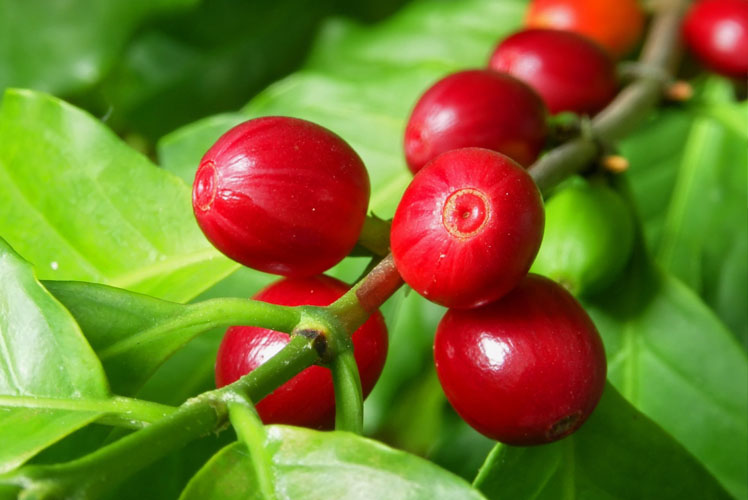
How Coffee Got Introduced to Guyana
Coffee it the third most consumed liquid in the world after water and tea, with more that 500 billion cups being consumed annually. Guyanese consume about 47 million cups annually.
Coffee beans are really the seeds found inside the fruit (called the cherry) of a coffee plant. The fruity outer part of the cherry is not eaten, but the seed is extracted and roasted.
Origin
It's origin dates back centuries to modern day Ethiopia where legend has it that Kaldi, the goat herder, discovered the potential of the beans.
According to the story, in the 15th century, Kaldi discovered coffee after he noticed that after eating the berries from a certain tree, his goats became so energetic that they did not want to sleep at night.
Kaldi's findings were reported to the local monastery's head monk, whereupon he made a drink with the berries. It was found that the drink kept him alert through the long hours of evening prayer. The word got spread among the other monks at the monastery about the energizing berries.
Coffee found its way to monasteries in Yemen which used it as an aid to concentration during prayers. It later spread to the Levant and Persia in the early 16th century, then arrived in Italy during the second half of the century. By the mid 17th century, it had reached India and the East Indies.
Coffee seedlings arrived in Martinique in 1720, which later sprouted thousands of coffee trees which enabled its spread to other Caribbean islands.
By 1852, globally, Brazil became the largest producer of coffee and has held that status ever since. The period since 1950 saw the widening of the playing field due to the emergence of several other major producers, notably Colombia, Ivory Coast, Ethiopia, and Vietnam; the latter overtook Colombia and became the second-largest producer in 1999. Modern production techniques along with the mass productization of coffee has made it a household item today.
Introduction to Guyana
According to Louis Holder, CEO of Guyanese company Amy's Pomeroon Foods, coffee grown in Guyana is among the oldest coffee in the New World, having been introduced by the Dutch in 1721.
Holder said that by 1810, British Guiana was one of the largest exporters of coffee in the world having exported 22 million pounds that year. But the Dutch grew Typica on low elevations, on the coastland of Guyana, whereas Typica favours high elevations. As a result of that, the yields of the plant dropped and Guyana lost its competitive advantage on the world market. Over time, most farmers switched to sugar and the coffee industry went into steep decline.
There was one exception—the Pomeroon—which became the last stronghold for coffee growers in Guyana, mainly because that region did not have large plots of flat land suitable for sugar cultivation.
Farmers continued to grow coffee in the Pomeroon long after the industry declined elsewhere. Most importantly, they continued to grow a unique breed of the Typica Arabica plant that is renowned for producing an exclusive type of ground coffee, one that is renowned for its unforgettable taste and exquisite aroma.
Rebirth
Although coffee growing continues today, there was a steady decline as Guyanese turned consumption of the instant coffee.
Sensing that the unique cultivar of the Typica Arabica coffee plant would be lost forever in Guyana, Holder laid the groundwork to start his own coffee business. According to him, he just couldn't let the most sublime coffee flavours the world has ever known be lost on account of Guyanese.
In 2015, Holder set his sights on producing an excellent quality product using the Pomeroon coffee cultivar with the objective of replacing five percent of the foreign coffee imports by the first year of operations.
Amy's Pomeroon Coffee is now a staple on supermarket shelves throughout Guyana. In April 2022, Amy's Pomeroon Foods received certification from the Guyana National Bureau of Standards (GNBS) to use the "made in Guyana" mark on its Regular and Mocha flavoured ground coffee as well as its roasted and green coffee beans. This certification is valid for one year and in order to become certified, manufacturers must use at least 60% raw materials from Guyana and employ 70% Guyanese staff.
According to Knoema, a data gathering platform, Guyana's coffee production was at level of 360 tonnes in 2020, down from 420 tonnes previous year, this is a change of 14.29%.
Even as the local coffee industry is attempting to make a comeback, Local Logistics has begun importation and distribution of a wide variety K-Cup coffee pods including Starbucks Pike Place Roast to satisfy the taste buds of young Guyanese coffee lovers.
Starbucks
Starbucks, the American coffeehouse chain, officially opened its doors in Guyana on April 25, 2023. It is located at Amazonia Mall in Providence, East Bank of Demerara. Prestige Holdings Guyana Limited, the franchisee, announced that it is the first of five stores to be opened across Guyana.
Updated on April 29, 2023.






